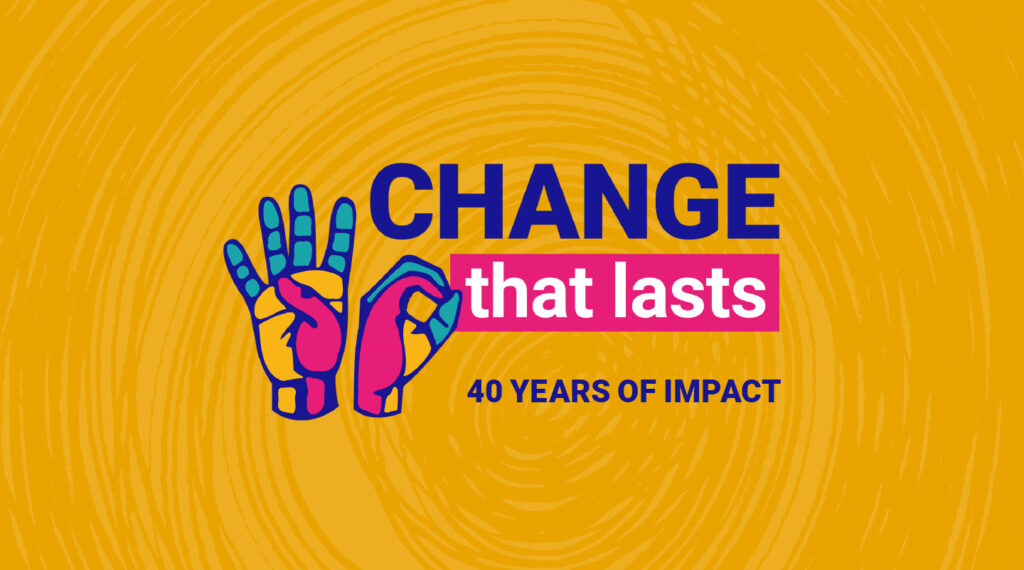Change that lasts: 40 years of impact at Mama Cash

It’s been forty years since its founding and Mama Cash, the world’s first international women’s fund, is still going strong. The two Co-Executive Directors, Saranel Benjamin and Happy Mwende Kinyili, talked about Mama Cash’s recently published Impact Study, Change that Lasts: 40 Years of Impact, in an open-hearted conversation about changing lives and the need for funds to be courageous.
Let’s start from the beginning. Why did Mama Cash commission the Impact Study?
Happy: Celebrating our 40th anniversary was a great milestone and cause for celebration. But it was also a moment to take stock; what exactly have we been doing all these years? Who did we work with and what progress did we make? From the start, we knew we were facing scepticism. That’s part of the challenge: before we can even make our case, we have to prove we’re worth listening to. We know the impact we’re making, and we have the evidence to back it up. But we wanted to gather all that data in one place and make it more visible for hesitant donors, to clearly demonstrate that feminist activism works. That’s why we decided to build on the existing evidence by commissioning a comprehensive study. But it can be scary to invite a group of critical feminist researchers to sift through your grantmaking data and compare them with your annual reports. And even more daunting – to identify where and how your funding shaped, supported and maybe even sparked the successes of feminists around the world. But we were in good hands with the wonderful VIVA Strategy team, who saw the Impact Study as a culmination of their life’s work and passion.
What struck you about the findings?
Happy: “Our Impact Study revealed that Mama Cash has moved €140 million over 40 years. But how does that translate to people’s daily lives? Let me give an example. Since the 1990s, we’ve supported the Mor Çatı movement in Turkey. One of their major successes came in 2009 when they submitted a key contextual brief in a lawsuit. The European Court of Human Rights cited this brief and – for the first time! – ruled that domestic violence is a form of discrimination and a government’s responsibility under the European Convention on Human Rights. This eventually led to the adoption of the Istanbul Convention in 2011, the most far-reaching international treaty on preventing and combating domestic and gender-based violence. The advocacy of just one group, Mor Çatı, had a profound impact on the lives of millions of women across 38 countries. So, if you ask me what stood out to me about the findings, it’s that I’m surprised more funders aren’t prioritising this work. We see how important it is every day, now I just hope others see it too.
Saranel: The Study also shows how funding can turn dreams into long-lasting change: impact that extends far beyond a typical five-year project. One story that really stuck with me is that of Sappho for Equality. In 1998, two young lesbians, Minakshi Sanyal and Subhagata Ghosh, dreamed of creating a space of belonging for queer people in India. With a seed grant from Mama Cash, they built a community resource centre 14 years ago that’s still a thriving and welcoming hub for queer people today, while also fighting for their rights. It’s a powerful example of how the personal is political. It also ties into one of the recommendations from our report: as donors, we need to back the seeding, growth and the realisation of dreams. Positive change often starts with taking a chance on an idea or opportunity. With seed funding, we can get things moving, and by sticking around with ongoing support, we help that change grow and make a bigger impact.”
How has the Impact Study shaped your understanding of the role of Mama Cash in the fight for justice?
Saranel: The study affirms what women’s funds are not bystanders in this fight; we’re central players who can direct significant funding to the hardest-to-reach areas and to those on the front lines of resistance. It showcases our expertise and skills through the success of the funds we’ve created and refined by actively listening to the needs of movements. When they asked us for travel grants in our early years, we responded, enabling groups to connect, organise, and build solidarity across borders. This led, among other things, to the foundation of the Women’s Global Network for Reproductive Rights. And when movements told us they needed multi-year grants in the ‘90s, we listened. This gave them the stability to hire staff, plan, and pursue long-term change with less stress. It offered them the flexibility and time to build relationships, shift norms, and achieve lasting impact. All these points have reinforced my belief that Mama Cash and other women’s funds are effective partners for feminist partners, bilateral donors, and philanthropy.
In your opinion, how do political and social backlashes affect the sustainability of movements?
Saranel: Feminist movements have been around for generations and will outlast us all. We’ve always resisted political and social backlashes, but those moments often lead to donors withdrawing funding for gender justice, right when it’s needed most. That makes the work of feminist movements harder, but it won’t stop them.
Happy: When Mama Cash started 40 years ago, no one else was doing this kind of work. The fact that it ledto so many other funds shows that there was a real need, and that it was a good idea that people bought into. Today, the need is even more urgent. We’ve seen big wins and big pushbacks, but our job is to fund those doing the most critical work. Our work is simple, but never easy. Every day, we choose to show up, knowing the challenges we’re facing are huge. It’s both terrifying and freeing, but the impact we make is also bigger than us. It keeps me going because others keep showing up too.
What do you think philanthropy, and specifically feminist activists, need most right now?
Saranel: We’re seeing a decline in funding for gender equality at a time when far-right governments and anti-rights movements are rising. This is a dangerous and terrifying trend. Philanthropy needs to be bold and courageous, stepping up to sustain the global feminist movement and the feminist funding ecosystem.
Happy: “Feminism is alive and strong across generations. People are engaging with and being exposed to more challenging ideas about intersectionality, decoloniality, climate justice, to name just a few. They’re building the will towards widespread change rooted in feminist principles. Increased funding will allow feminists of all ages to conspire, inspire, and mobilise more people. We’ve seen mass movements in the last 10-15 years, going back to Occupy Wall Street in 2011, to this year’s uprising of Kenyan youth. People want to act, so let’s harness that energy towards feminist futures.
What impact do you hope this study will have on the field, and how do you see Mama Cash continuing to play a role?
Saranel: I hope this study inspires real change in supporting feminist movements. Anti-rights groups are aggressively targeting feminist ideas, reframing patriarchy as the norm, and reversing hard-won rights. We’ve seen the effects: bans on sex education in Paraguay, restricted gender recognition in the UK, and criminalisation of abortion in Poland and the US. But research shows that when feminist groups are active, countries see smaller gender wage gaps, better access to resources, and greater democracy. These movements aren’t just tackling one issue, they’re addressing climate justice, racial justice, disability rights, and more. They recognise that systems of oppression like patriarchy, classism, and racism are intertwined and fuel global crises.
Happy: The reality is that most of these groups work on shoestring budgets. Resistance happens no matter what, but imagine the impact if they had the resources to match the scale of change they are building toward. That’s why I’m so proud our study shows we helped catalyse at least 250 million euros in more flexible, long-term funding to feminist movements through our global partnerships. But we need more funders to be bold, to listen to these movements and take risks alongside them. Don’t be afraid to support them for the long haul. Because they’re the ones that are driving lasting change.
What recommendations would you give to other funders and supporters of feminist movements to help create lasting change?
Happy: Flexible, core funding is essential, but too often funding is becoming overly restricted. If you’re part of an organisation, can you push the needle the other way? While accountability matters, there must be a better way to fund movements than the current restrictive model. We may never get the blank checks that right-wing political groups do, but we need more flexibility to keep building lasting impact.
Interview conducted by Annette Farshchi, Mama Cash writer
Authors


